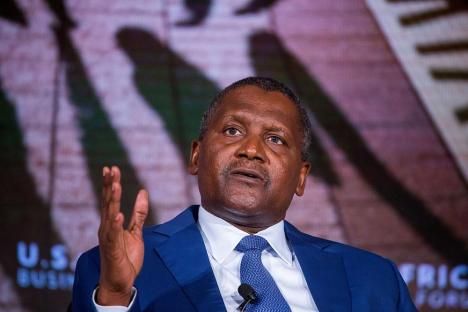Aliko Dangote, Africa’s richest man and Nigeria’s most influential industrialist, saw his net worth climb back to 29 billion US dollars, reversing earlier declines in the year. This rebound is more than a matter of personal fortune; it represents the resilience of Nigeria’s largest industrial empire, the shifting tides of global and domestic markets, and the risks and opportunities embedded in the country’s economic trajectory.
Dangote’s wealth has always been tightly bound to the performance of Dangote Cement, the flagship of his empire. In the first half of 2025, the company delivered an exceptional set of results, with revenues rising by almost 18 percent year on year and profits after tax more than doubling to ₦520 billion. Export sales surged, foreign subsidiaries turned profitable for the first time in over a decade, and operational margins expanded significantly. For an individual who holds close to ninety percent of the company, these results translated directly into a rebound in wealth. The cement business, long considered a defensive asset tied to Nigeria’s infrastructure demand, proved once again that it is the sturdy backbone of the Dangote fortune.
Yet it is not cement alone that explains this resurgence. The Dangote Refinery, Africa’s largest single-train petroleum processing facility, has become the second crucial driver of Dangote’s wealth. Though it has not yet reached full capacity, the refinery’s symbolic and strategic importance has already been capitalized into valuations. By processing Nigeria’s crude oil locally, it reduces the country’s reliance on imported fuel, offers the possibility of foreign exchange earnings through exports, and grants Dangote a unique position in an industry long dominated by international oil companies. Despite challenges such as labor unrest, crude supply disputes, and mismatches between naira and dollar transactions, the refinery has become a cornerstone in assessments of Dangote’s wealth because it represents the potential to transform Nigeria’s fuel economy.
Alongside these two giants are Dangote’s other businesses sugar, fertilizer, and diversified industrial holdings which continue to perform strongly. Dangote Sugar, for instance, reported a near 270 percent surge in operating profit during the same half-year period, a reminder that the empire is not reliant on a single stream of income. Fertilizer production, both existing and newly announced projects such as the $2.5 billion plant in Ethiopia, offers additional avenues for growth in sectors critical to African food security. Together, these diverse operations help cushion the volatility of cement and refining, while reinforcing Dangote’s image as a continental industrialist rather than merely a national magnate.
The trajectory of Dangote’s wealth over time underscores the scale of this latest rebound. From his first appearance on global billionaire lists in 2008 with just over $3 billion, Dangote’s fortune swelled past $20 billion by the mid-2010s, contracted during years of naira depreciation and economic slowdown, and rebounded again as his conglomerate expanded its reach. The return to the $29 billion threshold in 2025 is therefore part of a longer arc of cyclical decline and recovery, reflecting both Nigeria’s volatile macroeconomy and the structural advantages of large-scale industry.
Yet this story is incomplete without acknowledging the risks. The refinery has already been the site of labor disputes, with mass layoffs prompting union threats to cut off gas and crude supply. Regulatory negotiations with the government, as well as the challenge of securing crude under favorable terms, continue to loom. At the same time, Dangote Industries has carried a significant debt burden, leading to past downgrades by international rating agencies that worry about liquidity and the mismatch between dollar debt and naira earnings. Currency instability in Nigeria, high inflation, and potential downturns in construction demand also remain constant sources of vulnerability.
Even with these challenges, the broader significance of Dangote’s resurgence is undeniable. His net worth is more than a personal balance sheet—it is a mirror held up to Nigeria’s industrial ambitions. By producing cement, refining oil, manufacturing fertilizer, and refining sugar on an unprecedented scale, Dangote’s businesses reduce the country’s dependence on imports, save foreign exchange, and project a model of African self-sufficiency. They also embody the tensions of such ambition: the dependence on government policy, the strains of financing mega-projects, and the challenges of managing labor relations in a fragile economy.
Looking ahead, the sustainability of Dangote’s wealth at or above the $29 billion mark will depend on a handful of critical factors: whether the refinery can achieve stable crude supply and operate near its 650,000-barrels-per-day capacity; whether cement can maintain its export-led growth and profitability in Africa; whether new fertilizer projects can come online without excessive debt; and, perhaps most importantly, whether Nigeria can stabilize its currency and inflation to ensure that local profits translate into global wealth.
























































